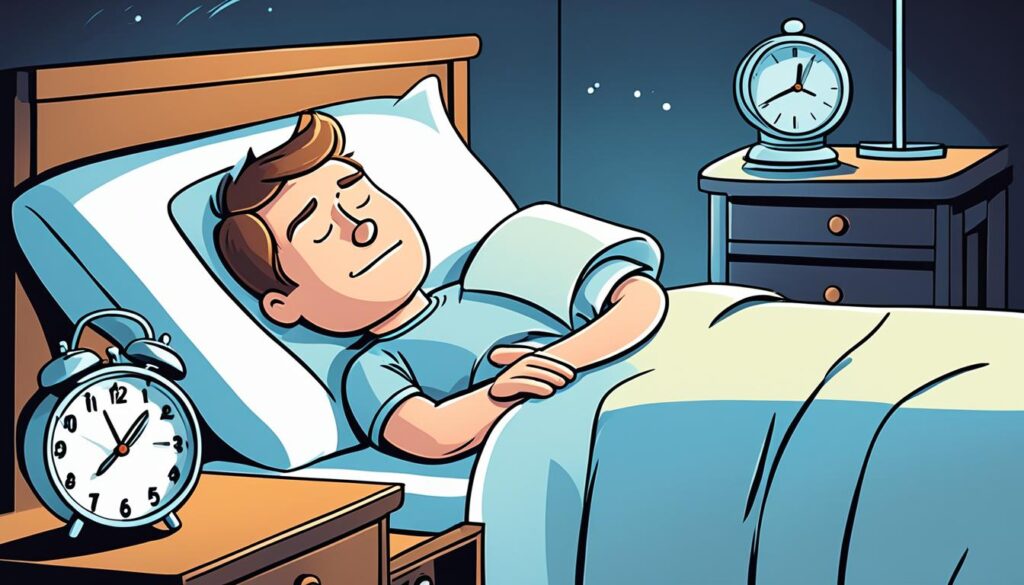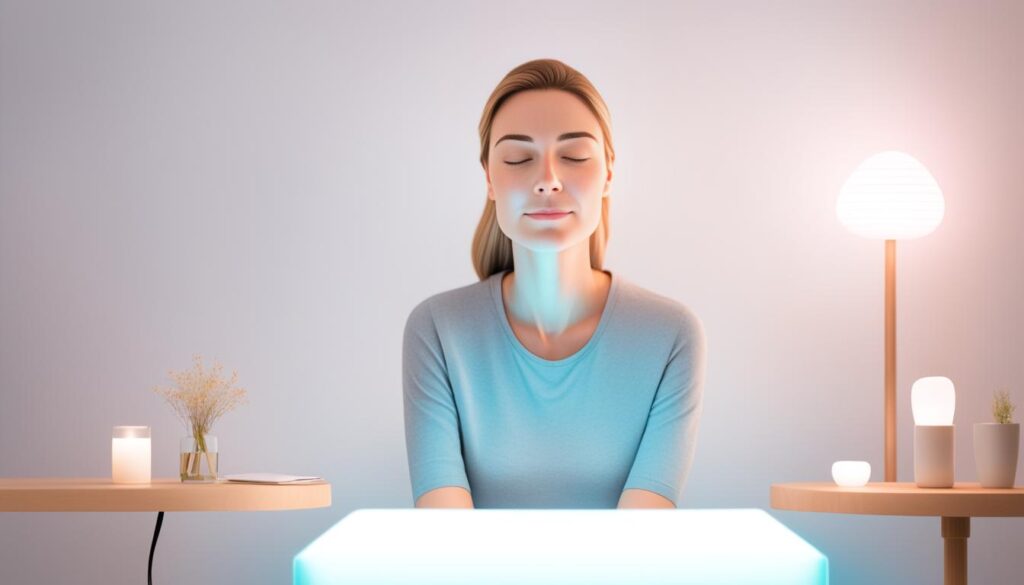Medically reviewed by Dr Chandril Chugh,
Renowned Neurologist and American Trained Specialist
Having trouble falling asleep or waking up feeling tired and groggy? It’s time to prioritize your sleep hygiene and take steps towards a better night’s rest. Sleep hygiene refers to a set of practices and habits that promote healthy sleep patterns, allowing you to wake up refreshed and energized each morning. In this article, we will provide you with 40 valuable tips for improving your sleep hygiene, focusing on creating a bedtime routine and optimizing your sleep environment.
Table of Contents
ToggleKey Takeaways:
- Establish a consistent sleep schedule by setting a fixed wake-up time and target bedtime.
- Create a sleep-friendly bedroom by investing in a comfortable mattress, supportive pillow, and cozy bedding.
- Relax before bed by practicing relaxation techniques such as reading, mindfulness meditation, and avoiding electronic devices.
- Manage light exposure by getting natural light during the day and avoiding bright light in the evening.
- Modify daily habits such as exercise, caffeine intake, alcohol consumption, late-night eating, and smoking to improve sleep quality.
1. Creating a Sleep-Friendly Bedroom
When it comes to getting a good night’s sleep, your bedroom environment plays a crucial role. Creating a sleep-friendly space can help you relax, unwind, and promote better sleep quality. Here are some tips to transform your bedroom into a sleep haven:
2. Invest in a Comfortable Mattress and Supportive Pillow
Your mattress and pillow are key players in providing comfort and support while you sleep. A mattress that is too firm or too soft can lead to discomfort and interfere with your sleep. Invest in a high-quality mattress that suits your preferred sleeping position and provides adequate support to your body. Similarly, choose a supportive pillow that aligns your neck and spine, reducing the risk of stiffness and soreness.
3. Choose Bedding for Comfort and Temperature Control
Your choice of bedding can significantly impact your sleep environment. Opt for sheets, blankets, and comforters made from breathable and soft materials such as cotton or linen. These fabrics wick away moisture and promote better airflow, keeping you cool and comfortable throughout the night. Consider using mattress toppers or mattress protectors that regulate temperature and provide extra cushioning for added comfort.
4. Keep the Bedroom Free from Excess Light and Noise
Light and noise can disrupt your sleep, so it’s important to minimize their presence in your bedroom. Install blackout curtains or blinds to block out external light sources and use earplugs or white noise machines to mask unwanted noises. If your bedroom is still not completely dark or quiet, consider using sleep masks and earplugs for a more peaceful sleep environment.
5. Manage Temperature and Humidity Levels
An optimal sleep environment has a comfortable temperature and humidity level. Aim for a cool and slightly ventilated room, typically around 18-21 degrees Celsius (65-70 degrees Fahrenheit), to facilitate better sleep. You can use ceiling fans, air conditioning, or humidifiers to regulate temperature and humidity levels according to your preference.
By creating a sleep-friendly bedroom environment with a comfortable mattress, supportive pillow, bedding that promotes temperature regulation, and minimizing light and noise, you can set the stage for a restful night’s sleep. Take the time to create a tranquil and soothing space that helps you relax and drift off into a deep slumber.

6. Establishing a Consistent Sleep Schedule
Creating a fixed sleep schedule is an essential aspect of maintaining good sleep hygiene. Consistency is key when it comes to regulating your body’s natural sleep-wake cycle, also known as the circadian rhythm. By following a regular sleep routine, you can improve your sleep quality and overall well-being.
To establish a consistent sleep schedule, consider the following tips:
- Set a Fixed Wake-Up Time: Determine a time that you need to wake up each day, including weekends. Stick to this wake-up time consistently, even on days when you may have had a poor night’s sleep.
- Identify a Target Bedtime: Calculate your target bedtime by counting back the number of hours you need for a restful night of sleep. Aim to go to bed at the same time each night to train your body to recognize when it’s time to wind down.
- Avoid Naps or Keep Them Short: While short power naps can be beneficial, it’s important to keep them limited to a duration of around 20-30 minutes and schedule them in the early afternoon. Napping too close to bedtime or for too long can disrupt your sleep schedule.
By adhering to a consistent sleep schedule, you’re training your body to follow a natural rhythm, promoting better sleep continuity and quality. It may take time for your body to adjust to the new schedule, but the benefits will be worth the effort.

Following a consistent sleep routine can improve your sleep quality, ensuring that you wake up feeling refreshed and energized throughout the day.
7. Relaxing Before Bed
Creating a bedtime routine that incorporates relaxation techniques can significantly improve your sleep quality. By engaging in calming activities before bed, you can unwind and prepare your mind and body for a restful night’s sleep. Here are some effective relaxation techniques to include in your bedtime routine:
1. Mindfulness Meditation
Practicing mindfulness meditation can help you relax and quiet your mind. Find a comfortable position, close your eyes, and focus on your breath. Pay attention to the sensations in your body and let go of any thoughts or worries that arise. Start with a few minutes and gradually increase the duration as you become more comfortable.
2. Reading
Reading a book before bed not only helps you wind down but also distracts your mind from daily stressors. Choose a book that you find interesting and soothing. Avoid reading from electronic devices as the blue light emitted can interfere with your sleep. Opt for a physical book instead.
3. Avoiding Electronics
Using electronic devices before bed can disrupt your sleep by stimulating your brain and interfering with your body’s natural sleep-wake cycle. Put away your phone, tablet, or laptop at least an hour before bedtime to allow your mind to unwind and prepare for sleep.
4. Creating a Calm Environment
Make your sleep environment conducive to relaxation. Dim the lights, adjust the room temperature to a comfortable level, and reduce any noise or distractions. Consider using earplugs or a white noise machine to drown out any disturbing sounds.
5. Progressive Muscle Relaxation
Progressive muscle relaxation involves tensing and then releasing each muscle group in your body to promote deep relaxation. Start with your toes and work your way up to your head, focusing on each muscle group for a few seconds before releasing the tension. This technique can help alleviate physical tension and induce a state of calmness.
Incorporating these relaxation techniques into your bedtime routine can help you unwind and prepare for a restful night of sleep. Find what works best for you and make it a regular part of your evening ritual.
8. Managing Light Exposure
Light exposure plays a crucial role in regulating our sleep-wake cycle, also known as the circadian rhythm. By understanding how light affects our bodies, we can optimize our sleep environment and enhance our sleep quality. In this section, we will explore the impact of natural light, the importance of avoiding bright light in the evening, and the benefits of light therapy when natural light is not available.
1. Get Natural Light Exposure:
Exposing yourself to natural light during the day helps synchronize your circadian rhythm and promotes better sleep at night. Try to spend time outdoors, go for a walk, or simply sit near a window to soak up the natural light.
2. Avoid Bright Light in the Evening:
Bright light in the evening can suppress the production of melatonin, a hormone that helps regulate sleep. To promote optimal sleep, dim the lights in your home as the night progresses. Use soft, warm-colored lighting, such as lamps with yellow or orange bulbs, to create a relaxing atmosphere.
3. Consider Light Therapy:
If you’re unable to expose yourself to natural light or need additional support in regulating your circadian rhythm, light therapy can be beneficial. Light therapy involves using a light therapy box or lamp that emits bright light, simulating natural sunlight. Follow the manufacturer’s instructions and consult with a healthcare professional before incorporating light therapy into your routine.

4. Minimize Electronic Device Usage:
Electronic devices emit blue light, which can disrupt the production of melatonin and interfere with your sleep. Avoid using electronic devices, such as smartphones, tablets, and computers, for at least an hour before bed. Instead, engage in relaxing activities such as reading a book or listening to calming music.
By managing your light exposure, you can align your circadian rhythm and improve your sleep quality. Incorporate these tips into your daily routine to create a sleep-friendly environment and enhance your overall well-being.
9. Modifying Daily Habits
In addition to creating a sleep-friendly environment and establishing a consistent sleep schedule, it’s vital to examine and modify your daily habits to promote better quality sleep. Certain lifestyle choices can significantly impact your ability to fall asleep and stay asleep throughout the night. Let’s explore some key areas where making positive changes can make a significant difference.
1. Regular Exercise
Regular physical activity is not only beneficial for your overall health but can also improve your sleep quality. Engaging in exercise during the day can help regulate your sleep-wake cycle, increase the depth of your sleep, and reduce insomnia symptoms.
Consider incorporating activities like brisk walking, jogging, yoga, or cycling into your daily routine. Aim for at least 30 minutes of moderate exercise most days of the week. However, it’s important to avoid exercising too close to bedtime, as it can energize your body and make it more challenging to fall asleep.
2. Caffeine Intake
Caffeine, found in coffee, tea, energy drinks, and some sodas, is a stimulant that can interfere with your sleep. It’s best to limit your caffeine intake, especially in the afternoon and evening. Be mindful of hidden sources of caffeine, such as chocolate and certain medications.
If you’re sensitive to caffeine, consider switching to decaffeinated options or herbal teas in the evening. Remember, even small amounts of caffeine can have a significant impact on your sleep quality.
3. Limit Alcohol Consumption
While a nightcap might seem relaxing, excessive alcohol consumption can disrupt your sleep patterns. Although alcohol can initially make you feel drowsy and help you fall asleep faster, it can disrupt the later stages of sleep, leading to more fragmented and less restorative sleep.
Avoid consuming alcohol close to bedtime and consider limiting your overall alcohol intake to ensure a more restful night’s sleep.
4. Avoid Late-Night Eating
Indulging in heavy meals, spicy foods, or large quantities of food too close to bedtime can cause discomfort and disrupt your sleep. Digestion requires energy and can keep you awake or lead to acid reflux.
Try to have your dinner at least a few hours before bedtime. If you’re hungry before bed, opt for a light snack that combines protein and complex carbohydrates, such as a small bowl of whole-grain cereal with milk.
5. Quit Smoking
Smoking has numerous adverse effects on your health, including disrupting your sleep. Nicotine is a stimulant that can hinder your ability to fall asleep and stay asleep throughout the night. Smokers often experience disrupted sleep patterns and decreased sleep quality.
Quitting smoking can lead to improved sleep, among other health benefits. If you’re struggling to quit, it’s advisable to seek support from healthcare professionals or smoking cessation programs to increase your chances of success.
By making these modifications to your daily habits, you can optimize your chances of experiencing better sleep. Let’s take a look at a summary of the key habits to focus on:
| Habit | Impact on Sleep |
|---|---|
| Regular Exercise | Promotes better sleep quality |
| Limiting Caffeine Intake | Reduces the likelihood of sleep disturbances |
| Avoiding Excessive Alcohol Consumption | Prevents disrupted sleep patterns |
| Avoiding Late-Night Eating | Reduces discomfort and improves digestion |
| Quitting Smoking | Enhances overall sleep quality |
It’s important to remember that making changes to your daily habits takes time and consistency. Implement these modifications gradually and gauge their impact on your sleep. By prioritizing healthy habits and optimizing your lifestyle choices, you can pave the way for a more restful and rejuvenating night’s sleep.

10. Enhancing Relaxation Techniques
To further enhance your relaxation before bed and improve your sleep quality, there are several effective techniques you can incorporate into your bedtime routine. These techniques, including hypnotherapy, guided imagery, meditation, and relaxation apps, can help calm the mind, reduce stress, and promote a deep state of relaxation.
Hypnotherapy
Hypnotherapy is a powerful technique that utilizes guided relaxation and focused attention to help you achieve a heightened state of relaxation. Through the guidance of a trained hypnotherapist, you can tap into your subconscious mind to address sleep-related issues and promote better sleep patterns.
Guided Imagery
Guided imagery involves using visualizations and positive mental imagery to create a peaceful and tranquil state of mind. By immersing yourself in calming imagery, such as scenic landscapes or serene settings, you can effectively reduce stress and anxiety, allowing for a more restful night of sleep.
Meditation
Meditation is a practice that involves focusing your attention and eliminating the stream of thoughts to achieve a state of deep relaxation and heightened awareness. By incorporating meditation into your bedtime routine, you can calm the mind, relax the body, and prepare yourself for a restful night of sleep.
Relaxation Apps
Relaxation apps provide a convenient and accessible way to access guided relaxation exercises and techniques. These apps often offer a variety of guided meditations, soothing sounds, and breathing exercises that can help you unwind and prepare for sleep. Some popular relaxation apps include Calm, Headspace, and Insight Timer.
11. Considering Sleep Supplements and Medical Advice
If you have tried various sleep hygiene practices but still struggle to find restful nights, you may consider exploring sleep supplements or natural sleep aids. However, it is crucial to approach these options with caution and consult a doctor before making any decisions.
Melatonin supplements are one commonly used sleep aid. Melatonin is a hormone produced naturally by the body to regulate the sleep-wake cycle. These supplements can be effective for individuals with circadian rhythm disturbances or jet lag, helping to reset their sleep patterns. However, it is important to consult a doctor before starting melatonin supplementation, as they can provide guidance on the appropriate dosage and duration of use.
Additionally, there are several natural sleep aids available, such as herbal supplements or over-the-counter medications. While these options may seem harmless, it is essential to consult a doctor to ensure their safety and effectiveness for your specific sleep concerns. They can provide personalized advice based on your underlying sleep conditions, medical history, and any potential interactions with other medications you may be taking.
It is vital to remember that sleep supplements and natural sleep aids should not be relied upon as a long-term solution for sleep problems. They are intended for short-term use or to support other sleep hygiene practices. Consulting a healthcare professional will help determine the most appropriate course of action for your sleep needs.
To summarize, when considering sleep supplements or natural sleep aids:
- Consult a doctor before starting any supplementation or using over-the-counter sleep aids.
- Discuss your underlying sleep conditions and medical history with your healthcare professional.
- Ensure you receive guidance on the appropriate dosage and duration of use.
- Remember that supplements and aids should complement other sleep hygiene practices.
The role of consulting a doctor for sleep issues
When it comes to sleep problems, it is essential not to self-diagnose or rely solely on supplements or natural remedies. Consulting a doctor can provide valuable insights into underlying sleep conditions that may be contributing to your difficulties. They can also help create a comprehensive treatment plan tailored to your specific needs.
Conclusion
Having good sleep hygiene is crucial for achieving better sleep and improving your overall well-being. By prioritizing a bedtime routine and creating a sleep-friendly environment, you can set yourself up for a restful night of sleep.
A consistent bedtime routine helps signal to your body that it’s time to unwind and prepare for sleep. This can include activities such as reading a book, practicing relaxation techniques like mindfulness meditation, or taking a warm bath. Whatever routine works best for you, make sure to stick to it to establish a healthy sleep pattern.
Additionally, creating a sleep environment that promotes relaxation and comfort is essential. Invest in a comfortable mattress and supportive pillow, choose bedding that feels cozy, and maintain a temperature that is conducive to sleep. Keep your bedroom free from excess light and noise to create a calm and peaceful atmosphere.
By prioritizing sleep hygiene, incorporating a bedtime routine, and optimizing your sleep environment, you can improve the quality of your sleep and wake up feeling refreshed and rejuvenated. Take these steps to prioritize your sleep and watch the positive impact it has on your overall health and well-being.
FAQ
What is sleep hygiene?
Sleep hygiene refers to practices and habits that are conducive to a good night’s sleep. It involves creating a bedtime routine and optimizing the sleep environment to promote restful sleep.
How can I create a sleep-friendly bedroom?
To create a sleep-friendly bedroom, it is important to invest in a comfortable mattress and supportive pillow. Choose bedding that feels comfortable and maintains a comfortable temperature. Keep the bedroom free from excess light and noise to promote better sleep.
Why is establishing a consistent sleep schedule important?
Establishing a consistent sleep schedule helps regulate your body’s natural sleep-wake cycle. Set a fixed wake-up time and identify a target bedtime to maintain a consistent sleep routine. Avoid napping or limit naps to a short duration in the early afternoon.
What relaxation techniques can help me sleep better?
Incorporating relaxation techniques into your bedtime routine can promote better sleep. Activities such as reading, practicing mindfulness meditation, and avoiding the use of electronic devices before bed can help you relax and prepare for sleep.
How does light exposure affect sleep?
Light exposure plays a crucial role in regulating our sleep-wake cycle. Get natural light exposure during the day to promote wakefulness and regulate your circadian rhythm. Avoid bright light in the evening, especially from electronic devices, as it can disrupt sleep. Consider using light therapy if natural light is not available.
What daily habits can impact sleep?
Several daily habits can affect your sleep quality. Incorporate regular exercise into your daily routine to promote better sleep. Reduce caffeine intake in the afternoon and evening, limit alcohol consumption, avoid late-night eating, and quit smoking, as these can all disrupt your sleep.
Are there any other relaxation techniques that can help with falling asleep?
Yes, there are other relaxation techniques that can assist with falling asleep. Hypnotherapy, guided imagery, and meditation are some techniques that promote relaxation before bed. You can also consider using relaxation apps to facilitate a state of relaxation and aid in falling asleep.
Should I consider sleep supplements or natural sleep aids?
The use of sleep supplements, such as melatonin, and natural sleep aids can be considered. However, it is important to consult a doctor before starting any supplementation. It is also advisable to seek medical advice if you have underlying sleep conditions that may require professional treatment.
